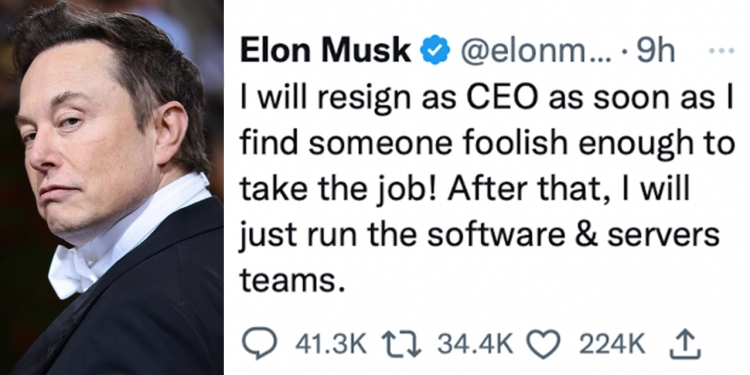In the latest in an entirely predictable series of events, Elon Musk has agreed to resign as Twitter CEO, following a public poll he created himself…on Twitter. With more than 17 million votes cast, the final results—which Musk said he will abide—were 57.5% “Yes”, 42.5% “No”.
I will resign as CEO as soon as I find someone foolish enough to take the job! After that, I will just run the software & servers teams.
— Elon Musk (@elonmusk) December 21, 2022
There is, of course, a caveat to this—Musk said he will only step down once he finds someone “foolish enough” to replace him. He added that he will continue to manage Twitter but in a slightly smaller capacity, handling “just” the software and server teams.
As The Verge pointed out, the social media platform is primarily made up of its software and server teams, so he will still have direct control of almost all aspects of the company, only without the highly visible CEO title. So don’t expect Musk’s off-the-rails management of Twitter to end anytime soon—you’ll probably just hear about it less.
How did this all come about?
Exactly. Twitter should be easy to use, but no more relentless free advertising of competitors. No traditional publisher allows this and neither will Twitter.
— Elon Musk (@elonmusk) December 18, 2022
Musk’s much-publicised USD44 billion (about RM195.25 billion) Twitter buyout has been followed by a string of highly controversial policy changes, from making its verified checkmarks available to purchase to gutting entire content moderation teams—leading to hilarious (and predictable) results.
But the South African tycoon’s latest move may have stirred the hornet’s nest one too many times. On December 19, Twitter announced it would remove accounts posting links from competitors like Facebook, Instagram and Mastodon. A few hours later Musk tweeted: “Twitter should be easy to use, but no more relentless free advertising of competitors.”
Going forward, there will be a vote for major policy changes. My apologies. Won’t happen again.
— Elon Musk (@elonmusk) December 18, 2022
Shortly after, however, the company appeared to reverse its position, deleting tweets and a support page related to the move. Musk apologised, tweeting “going forward, there will be a vote for major policy changes” and that it “won’t happen again.” As an apparent show of cooperation, he tweeted the aforementioned poll barely three minutes later.
Again, you shouldn’t expect anything to change as a result of this poll, even if Musk eventually finds that foolish person. After all, the man said in November that his time as CEO was temporary and had already been searching for a replacement even before the poll.








